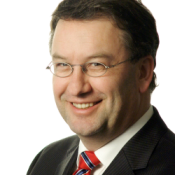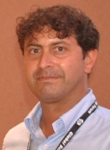
|
|
Keynote Speakers
Simulation and modelling of transport networks and logistic nodes

|
Prof. Uwe Clausen |
Abstract
Transport volumes keep growing globally, but the sizes of individual shipments stay the same or are partly even decreasing while at the same time service expectations of customers are high. In order to execute transport tasks efficiently transport service networks play a vital role. These networks are dedicated e.g. to parcel, express or less-than-truckload-shipments and related logistic services. Analysis and optimization of their structure and the efficient operation of their nodes (depots, hubs, terminal) have to be supported by simulation models to achieve robust solution. Operators can thus improve their efficiency, reduce handling costs and increase the performance of their terminal operations. The link between material flow simulation and arriving and departing traffic is one of the key challenges. The paper addresses the impact of different operational strategies and identifies the potential for improvement in transport networks and fleet control.
Biography
Uwe Clausen is Managing Director of the Institute of Transport Logistics at TU Dortmund University and – in joint appointment - also director of the Fraunhofer-Institute for Material Flow and Logistics in Dortmund (since 2001) and Chairman of the “Fraunhofer Traffic and Transportation Alliance” (since 2003). He worked in the logistics service industry as European Operations Director at Amazon.com and logistics manager at Deutsche Post DHL.
His research areas are:
Intermodal transportation, commercial traffic modeling, network optimization and distribution systems, green logistics
You can download the presentation here (2.5MB) 
Scheduling problems with precedence constraints: models and algorithms

|
Dr. Roberto Montemanni |
Abstract
Scheduling problems with precedent constraints are common in many real production planning and transportation applications.
The most simple version of the problem is the so-called sequential ordering problem. It consists in sequencing a given set of activities on a machine with the aim of minimizing a cost function depending on the sequence itself, while fulfilling a given set of precedence constraints between the activities.
In this presentation, after having reviewed some real-world applications of the sequential ordering problem, mathematical programming models and state-of-the-art optimization approaches will be discussed and commented, in the optic of possible generalizations to other scheduling problems with similar characteristics. In particular, it will be analyzed how a metaheuristic algorithm based on ant colony optimization can be effectively hybridized with a mixed integer programming solver, according to a recent paradigm called matherustics.
Biography
Roberto Montemanni is professor of advanced algorithms at the University of Applied Sciences of Southern Switzerland and lecturer at the University of Lugano. He is active as a senior researcher at the Dalle Molle Institute for Artificial Intelligence (IDSIA), Switzerland, where his main research interests include the development of mathematical programming models and algorithms for combinatorial optimization problems arising in transportation and telecommunication. On these topics he leads several research projects funded by the Swiss National Science Foundation and the Swiss Hasler Foundation and have published more than 70 peer-reviewed papers. He holds a doctorate in applied mathematics from the University of Glamorgan, U.K. and a Laurea degree in computer science from the University of Bologna, Italy.



 Tel +49 231 97 43 400
Tel +49 231 97 43 400 Fax +49 231 97 43 402
Fax +49 231 97 43 402 Email:
Email: 







